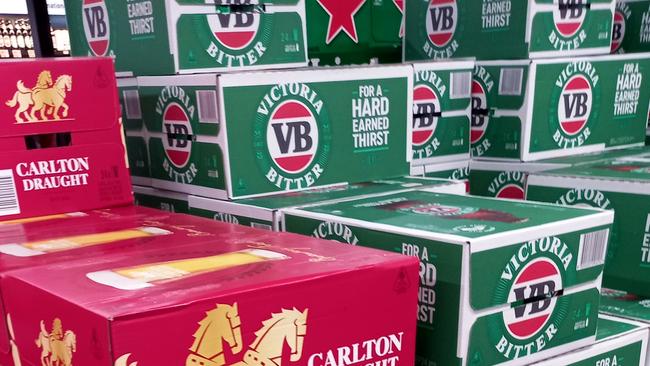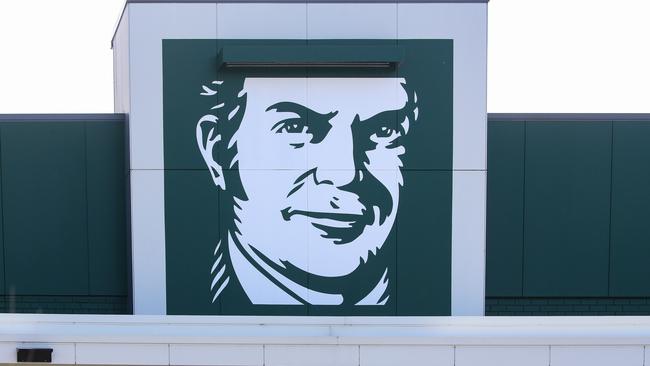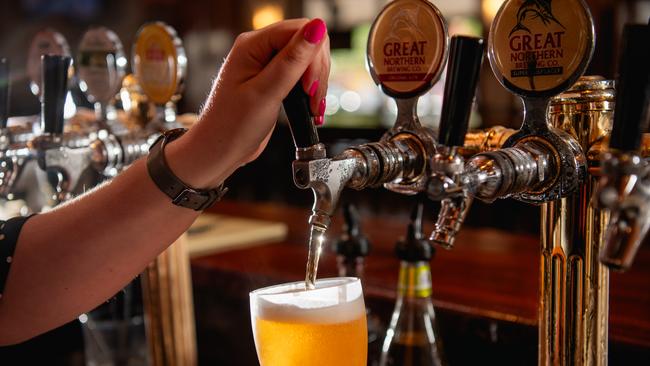United Workers Union strike threatens Christmas booze supplies with Dan Murphy’s, BWS outlets impacted in NSW and Victoria
Warehouse workers are threatening to disrupt booze supplies to Dan Murphy’s and BWS outlets in the lead up to Christmas.

Warehouse workers are threatening to disrupt booze supplies to Dan Murphy’s and BWS outlets in the lead up to Christmas after United Workers Union members voted to take indefinite strike action at four Woolworths’ distribution centres from next week.
The indefinite strike action was overwhelmingly endorsed at stop work meetings of union members at the four sites in Victoria and New South Wales, including the Melbourne Liquor centre which supplies alcohol to Dan Murphy’s and BWS outlets.
The outlets are owned by the Endeavour Group, which also owns a network of 350 pubs after its spin-off from Woolworths in June 2021.
UWU national secretary Tim Kennedy said the industrial action, expected to start from late next week, would disrupt alcohol supplies to Dan Murphy’s and BWS outlets in Victoria in the lead up to Christmas.
“There will be a booze shortage,” he told The Australian. “If the strike action goes ahead, (despite) contingencies that the company puts in place, there will still be shortages.
“It will still cause a major disruption and it will be on a scale that we actually haven’t seen before if it goes ahead at four sheds at once which is what the notice (of protected industrial action) will say.”

Woolworths Group’s supply chain arm, Primary Connect, says it has contingency plans designed to ensure minimal disruption to supplies, including building up stock in stores and using other distribution centres.
An Endeavour Group spokeswoman said contrary to the union claims, “we would like to reassure our customers that we do not foresee any major impacts to stock availability in stores over the festive season”. “We are committed to ensuring our customers have access to the products they love over the busy festive period ahead,” she said.
Mr Kennedy said Woolworths’ focus on contingency plans to combat the industrial action rather than on what was needed to reach agreement with the union reflected a change in behaviour by the company.
“Let’s be clear: they don’t employ these 1500 workers in these four warehouses because they don’t need them. If they’re not working, the network has never had more than one warehouse down at a time,” he said.
“This will be a factor of four down the eastern seaboard at the busiest time of year with some of their most high moving products through some of their sheds.
“Liquor is important at this time of the year. It’s moving a lot. It will be significant. You can’t replace an automated warehouse with contingencies. You can’t replace five million cartons in a hurry. There’s no capacity in the system.”
While workers at the four centres are pursuing “cost of living wage increases” ranging from 10 per cent to 12.5 per cent annually, Mr Kennedy signalled the workers were prepared to consider smaller pay rises provided they were above the inflation rate.
Primary Connect has offered pay rises of 10 per cent over three years to workers at the Melbourne South Regional distribution centre; 12.1 per cent over four years to Melbourne Liquor centre workers, 7.1 per cent over two years to Wodonga centre workers and 12.05 per cent over three years to workers at the Erskine Park centre in NSW.

Mr Kennedy said the company would have to lift its offer to about 4.5 per cent or 5 per cent annually. “We want real wage increases that basically take people ahead of where the inflation rate is at the moment,” he said. “They are going to have to be at least a per cent or a per cent and half higher (than the current offer) and they could do that easily.”
But he said agreement could not be reached unless Primary Connect scrapped its Coaching and Productivity Framework which the union said used engineered standards to discipline or even fire people for not meeting company stipulated speeds of working.
“Unless there is a change in the company’s position in terms of the framework and a real wage increase in each year of the agreement then they will roll forward,” he said. “If they move on those issues, we will call meetings of members to consider it.”
In a statement on Wednesday, a Primary Connect spokeswoman said the company had not received any formal notice of further industrial action from the union after the one hour work stoppages on Tuesday.
“We value our team and are deeply committed to reaching an agreement as quickly as possible so they can receive the benefit of their new pay rates before Christmas,” she said.
She said the company had put forward several offers with “competitive pay that is above industry standards, above local market rates, and well above the award”.
“The most common earnings for full time team members on the four DC sites which took part in industrial action yesterday, is between $85,000 and $95,000,” she said.
“Our latest offers would have taken hourly rates at these sites to approximately 40 to 60 per cent above the Storage Services award, and above inflation.”

The spokeswoman said the framework was “intended to enable us to work with each team member to the best of their ability to ensure a fair approach to standards is applied to any personal circumstances or abilities”.
“Safety is implicit in the standards we use in our DCs (distribution centres),” she said. “The union is asking for us to have no way to measure performance or manage underperformance. Less than 2 per cent of our team have experienced coaching or retraining to improve performance under the framework.
“In the case that industrial action does escalate, we have contingency plans in place to ensure minimal disruption to customers, including building up stock in stores and utilising our other DCs.
“If there is industrial action, the rest of our 16 DCs nationally will be operating as usual, with over 7,500 team members working hard continuing to move products to stores.






To join the conversation, please log in. Don't have an account? Register
Join the conversation, you are commenting as Logout